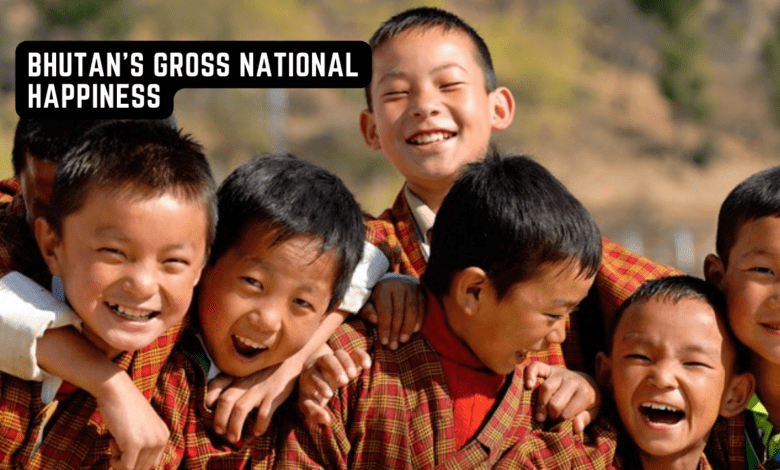🇧🇹 Bhutan’s Gross National Happiness: A Cultural Exploration 🌼
Uncover the Secrets to Bhutan's Happiness Index 📜🔍

Introduction
Bhutan, a small Himalayan kingdom nestled between India and China, has garnered global attention for its unique approach to measuring the well-being of its citizens. While most nations focus primarily on Gross Domestic Product (GDP) as a measure of progress, Bhutan places a greater emphasis on Gross National Happiness (GNH).
This novel concept, coined by the Fourth King of Bhutan, King Jigme Singye Wangchuck, in the 1970s, aims to prioritize the overall happiness and well-being of the Bhutanese people over material wealth and economic growth. In this blog post, we will embark on a cultural exploration of Bhutan’s Gross National Happiness, delving into its origins, key principles, and the impact it has had on the nation’s culture and way of life.
The Origins of Gross National Happiness
Historical Background of Bhutan
Bhutan, a small Himalayan kingdom nestled between India and China, is renowned not only for its stunning natural beauty but also for its unique approach to measuring progress and well-being through Gross National Happiness (GNH). To understand the origins of GNH, it’s essential to delve into Bhutan’s historical background.
Bhutan’s history is rich and steeped in Buddhist tradition. It was unified in the 17th century under the leadership of Shabdrung Ngawang Namgyal, who established a theocratic system that endured until the early 20th century. In 1907, Bhutan underwent a significant transformation with the coronation of King Ugyen Wangchuck, marking the beginning of the hereditary monarchy. This transition set the stage for Bhutan’s unique path to development and well-being.
King Jigme Singye Wangchuck and the Development of GNH
The origins of GNH can be primarily attributed to the visionary leadership of King Jigme Singye Wangchuck, who ruled Bhutan from 1972 to 2006. King Wangchuck recognized that economic growth alone did not guarantee the happiness and well-being of his people. In response to this realization, he introduced the concept of Gross National Happiness.
King Wangchuck’s approach to GNH emphasized balancing economic progress with the preservation of Bhutan’s unique culture, environment, and spiritual heritage. His reign witnessed significant reforms, including the decentralization of power, the promotion of education and healthcare, and the conservation of Bhutan’s pristine environment. These initiatives laid the foundation for GNH and marked Bhutan as a pioneering nation in the pursuit of holistic well-being.
The Four Pillars of GNH
At the core of Bhutan’s GNH philosophy are the four pillars, each representing a dimension of well-being that extends beyond traditional economic metrics:
- Sustainable Socioeconomic Development: Bhutan places a strong emphasis on sustainable economic growth that benefits all citizens, reducing poverty and inequality. This pillar acknowledges that material well-being is essential but not sufficient for happiness.
- Conservation of the Environment: Bhutan is committed to preserving its pristine environment, which is critical to the well-being of its people. This pillar recognizes the interconnectedness of nature and happiness.
- Preservation and Promotion of Culture: Bhutan takes pride in its rich cultural heritage. This pillar emphasizes the importance of preserving and promoting Bhutanese culture and traditions as an integral part of national identity and happiness.
- Good Governance: Effective governance is vital for ensuring the well-being of citizens. This pillar underscores the importance of a just and accountable government that prioritizes the welfare of its people.

Key Principles of Gross National Happiness
Understanding the Nine Domains of GNH
Gross National Happiness (GNH), the holistic well-being framework pioneered by Bhutan, is built upon the foundation of nine interconnected domains, each of which contributes to the overall happiness and fulfillment of a nation’s citizens. These domains offer a comprehensive perspective on well-being:
- Psychological Well-being: GNH recognizes the significance of mental health and emotional stability in individuals’ lives. This domain encompasses emotional resilience, mental health, and the overall state of happiness.
- Health: Good physical health is a fundamental aspect of well-being. Bhutan emphasizes access to quality healthcare, promoting a healthy lifestyle, and addressing health disparities as key components of GNH.
- Education: Education is a powerful tool for personal growth and societal progress. GNH values both formal and informal education, aiming to provide equal access to quality education for all citizens.
- Time Use: How individuals allocate their time can significantly impact their well-being. Balancing work, leisure, and personal time is vital for overall happiness.
- Cultural Diversity and Resilience: Bhutan places great importance on preserving and celebrating its diverse cultural heritage. This domain acknowledges the role of culture in fostering a sense of identity and belonging.
- Good Governance: Effective and transparent governance is essential for the well-being of citizens. GNH promotes accountable and just governance that considers the needs and aspirations of the people.
- Community Vitality: Strong social bonds and a sense of belonging are critical for happiness. This domain focuses on building vibrant communities, fostering social cohesion, and ensuring equitable access to resources.
- Environmental Conservation: Bhutan’s pristine environment is integral to its well-being. GNH emphasizes sustainable environmental practices to protect natural resources and maintain ecological balance.
- Living Standards: While not the sole focus, material well-being remains an important aspect of GNH. This domain includes factors such as income, housing, and access to basic necessities, with an emphasis on reducing income inequality.
The Importance of Balancing These Domains
One of the key principles of GNH is the recognition that these nine domains are interconnected and interdependent. To achieve genuine well-being, it’s crucial to strike a balance among them.
For instance, economic growth should not come at the expense of environmental degradation, and personal well-being should not be sacrificed for the sake of long working hours. Balancing these domains ensures a holistic approach to well-being that considers the overall quality of life for citizens. Check out Wikipedia post on this topic.
How GNH Departs from Traditional Economic Metrics
GNH represents a departure from conventional economic metrics such as Gross Domestic Product (GDP) because it places people’s well-being and happiness at the forefront. While GDP measures economic output, it often neglects important aspects of human flourishing, such as mental health, social connections, and environmental sustainability.
GNH recognizes that true progress should be based on more than just material wealth and consumption. It prioritizes a multidimensional view of well-being that encompasses the physical, mental, social, cultural, and environmental dimensions of life, thereby offering a more comprehensive and sustainable approach to development and happiness.
Bhutan’s Influence on Global Happiness Discourse
International Recognition of GNH
Bhutan’s Gross National Happiness (GNH) has had a profound impact on the global discourse on happiness and well-being. While GNH originated as a Bhutanese concept, it has gained international recognition and inspired discussions on alternative measures of progress and happiness.
One significant milestone in the international recognition of GNH was the adoption of a United Nations General Assembly resolution in 2011. The resolution recognized the pursuit of happiness as a fundamental human goal and called on member states to consider happiness and well-being in their public policy agendas. This acknowledgment of GNH at the global level marked a turning point in the way nations think about development and quality of life.
Lessons and Inspirations for Other Nations
Bhutan’s GNH has offered valuable lessons and inspirations to other nations:
- Holistic Well-being: GNH’s emphasis on a holistic approach to well-being, which includes not only economic factors but also social, cultural, environmental, and mental aspects, has encouraged other countries to rethink their development strategies.
- Sustainable Development: Bhutan’s commitment to environmental conservation within the GNH framework has inspired global discussions on sustainable development and the importance of safeguarding natural resources for future generations.
- Cultural Preservation: Bhutan’s efforts to preserve its unique culture and traditions have encouraged other nations to consider the role of cultural heritage in fostering a sense of identity and belonging.
- Community and Social Cohesion: GNH’s focus on building strong communities and social bonds has prompted discussions about the importance of social cohesion and inclusivity in society.
- Happiness as a Policy Goal: Bhutan’s recognition of happiness as a central policy goal has led other countries to explore alternative indicators of progress beyond economic metrics like GDP. Several nations have begun measuring well-being and happiness alongside economic growth.
Challenges and Criticisms of GNH
Despite its positive influence, GNH has faced challenges and criticisms:
- Subjectivity: Some critics argue that happiness is a highly subjective concept that is difficult to measure accurately and compare between individuals and nations.
- Cultural Specificity: GNH is deeply rooted in Bhutanese culture and values, which may not be directly applicable to other nations with different cultural contexts.
- Practical Implementation: Implementing GNH in practice can be challenging, as it requires a comprehensive approach to policymaking and data collection that may not align with traditional governance structures.
- Trade-offs: Balancing the various domains of GNH, such as economic growth and environmental conservation, can be complex and may require making difficult trade-offs.
- Global Economic Realities: In a globalized world, nations often face pressures to prioritize economic competitiveness, which may conflict with GNH principles.
Frequently Asked Questions
- What is Bhutan’s Gross National Happiness?
Bhutan’s Gross National Happiness is a holistic development philosophy that prioritizes well-being over mere economic growth.
- How is GNH measured?
GNH is measured through nine domains that assess psychological well-being, health, education, and more.
- What role does Buddhism play in Bhutanese culture?
Buddhism is central to Bhutanese culture, influencing art, festivals, and daily life.
- Can tourists experience Bhutan’s Gross National Happiness?
Yes, tourists can immerse themselves in Bhutanese culture, attending festivals and learning about the country’s unique way of life.
- How has Bhutan preserved its environment?
Bhutan’s commitment to conservation includes maintaining a forest cover of over 70%, making it a carbon-neutral nation.
- What can the world learn from Bhutan’s GNH?
Bhutan’s GNH offers a fresh perspective on development, emphasizing holistic well-being and cultural preservation.
Conclusion
Bhutan’s Gross National Happiness is not merely an economic metric; it is a profound philosophy that shapes the very fabric of Bhutanese society. As we’ve explored its origins, key principles, and impact on Bhutanese culture, we have gained insight into a nation that prioritizes the happiness and well-being of its citizens above all else.
While GNH may not be a one-size-fits-all solution for every country, it serves as an inspiring example of how a nation can seek to balance economic development with cultural preservation, environmental stewardship, and the overall happiness of its people. Bhutan’s unique approach challenges us to reevaluate our own measures of progress and consider the broader implications of our pursuit of happiness.
In the end, the pursuit of Gross National Happiness is a journey that extends far beyond the borders of Bhutan, inviting us all to contemplate what truly makes a nation, and its people, happy and fulfilled.
Up Next
🌄 Exploring the Hidden Wonders of Cappadocia’s Ancient Caves, Turkey 🕳️




Facebook Comments